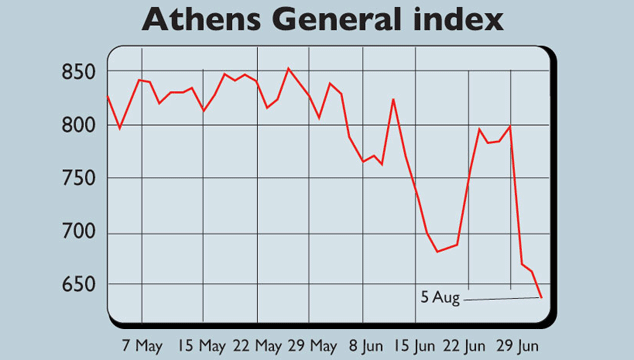
The Greek stockmarket, closed when the latest crisis came to a head in late June, re-opened last Monday – and promptly plunged. It closed 16% down, its worst performance since the global crash of 1987. The banks, which had been bleeding capital before they were closed for three weeks, fell by 30%, the daily limit, in a few minutes. The Athens General index slipped a little further the next day.
Grim data covering the past few weeks rattled investors too. An index tracking the manufacturing sector showed that activity plummeted to a record low last month. A federation representing small businesses said their average turnover fell by 48% in July.
What the commentators said
The Athens index this week “resembled one of those plate-smashing parties”, said Robert Lea in The Times. We are now starting to get a glimpse of the damage done by weeks of capital controls and bank closures. Restrictions on bank transfers and withdrawals caused supply problems in the manufacturing sector. The paralysing uncertainty over whether Greece could stay in the eurozone or not just made things worse. Greece is back in a nasty recession after only emerging from a six-year downturn late last year.
That’s “quite an achievement”, considering the economy is already 30% smaller than it was in 2008, said Louise Cooper in The Times. And it could complicate further discussions over Greece’s third bailout package.
The International Monetary Fund (IMF), one of its creditors, is basing its forecast of Greece’s debt sustainability, and the bailout cash it needs, on GDP this year being the same as 2014. That now looks “absurdly and laughably optimistic”. The bailout sum under discussion has already jumped from around €30bn in early July to the €86bn being negotiated now.
What’s more, said Andrew Lilico in The Daily Telegraph, the IMF may be loath to participate in the bailout. It wants Greek debts written down and the government to demonstrate a strong commitment to structural reform. Yet the Greek government is deeply split and Europe won’t countenance another write-down, so neither of its wishes will be fulfilled.
If the IMF pulls out, Europe may have to stump up even more, which could be “the last straw for certain members”. With the bailout already looking inadequate and the politics getting more and more complicated, don’t rule out a Grexit.